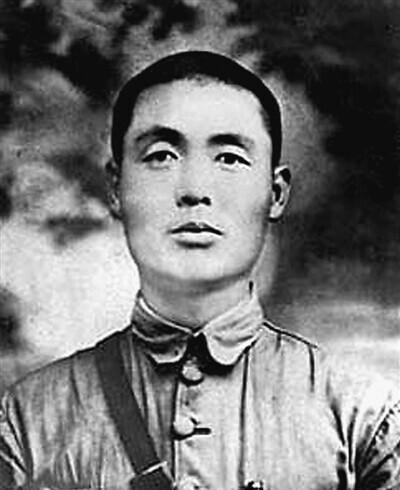
He was the main leader of the Ningdu Uprising, the Iron Stream Defender of the Long March of the Central Red Army; he followed the Western Route Army to the Hexi Corridor and finally spilled blood on GaotaiCheng; he was called "resolute revolutionary comrade" by Mao Zedong, and he was the iron-blooded general Dong Zhentang.
Dong Zhentang was born in 1895 to an ordinary peasant family in Xinhe County, Hebei Province. In 1917, he was admitted to the Qinghe Army Middle School in Beijing, and in 1920, he entered the Artillery Department of the Baoding Army Officer School for further study, and after graduation, he went to Feng Yuxiang's department as a staff clerk, and because of his bravery in battle and outstanding combat achievements, he was promoted from platoon commander all the way to division commander. After the Battle of the Central Plains, the unit was reorganized into the 73rd Brigade of the 26th Route Army of the National Revolutionary Army, with Dong Zhentang as the brigade commander.
In 1931, Dong Zhentang's unit was transferred by Chiang Kai-shek to Jiangxi to "encircle and suppress" the Red Army. Dong Zhentang, who was extremely disgusted with the civil war, resisted. After the "918" incident, Chiang Kai-shek vigorously advocated that "foreign countries must first be safe inside."Dong Zhentang was extremely disappointed, and his thinking became more and more inclined to revolution. After the active struggle of the party organization, on December 14, 1931, Dong Zhentang, Zhao Bosheng and Ji Zhen led more than 17,000 officers and men of the 26th Route Army to declare an uprising in Ningdu, Jiangxi. Since then, Dong Zhentang has devoted himself to the cause of the liberation of the Chinese people without hesitation.
The Ningdu uprising was reorganized into the 5th Army of the Chinese Workers' and Peasants' Red Army, with Dong Zhentang as the deputy commander-in-chief of the corps and the commander of the 13th Army, and later as the commander of the Red 5th Army. He led his troops to participate in the battles of Ganzhou, Zhangzhou, and Nanxiong Shuikou, and cooperated with the brother legions to crush the fourth "encirclement and suppression" of the Kuomintang army, and was awarded the Red Banner Medal by the Provisional Central Government of the Chinese Soviet Republic. In 1932, Dong Zhentang joined the Communist Party of China, and in 1934, he was elected as a member of the Central Executive Committee of the Chinese Soviet Republic.
After the Long March of the Central Red Army, Dong Zhentang led the Red 5th Army to undertake the task of rear guard. In the Battle of the Xiangjiang River, the Red 5th Army successfully covered the main force of the Red Army and the central organs to cross the river at a tragic cost of sacrificing more than 5,000 people. The Red Army forcibly crossed the Jinsha River, and the Red 5th Army was ordered to block the enemy, stubbornly held out for 9 days and 9 nights, and successfully completed the mission. In the baptism of fire, Dong Zhentang and the Red 5Th Army under his command gradually formed a combat style of fighting defensive warfare and blocking warfare, completed the task of blocking the Kuomintang army many times, and made outstanding military achievements in order to ensure that the main force of the Central Red Army went north, and the Red 5th Army was awarded the glorious title of "Iron Stream Defender".
In June 1935, after the First and Fourth Fronts met the divisions, the 5th Army was renamed the 5th Army, and Dong Zhentang was appointed as the commander. In October 1936, after the three main forces of the Red Army met in Huining, the Red 5th Army was incorporated into the Western Route Army and marched towards Ningxia, Gansu and Xinjiang.
At the end of December 1936, as the vanguard of the Western Route Army, Dong Zhentang led the Red 5th Army to capture Linze County, and soon after captured Gaotai County, and immediately organized forces to publicize the Party's policies, extensively mobilize the masses, organize anti-Japanese people's governments, and establish anti-Japanese armed forces. On January 12, 1937, the northwestern warlord Ma Bufang mobilized heavy troops to besiege Gaotai. The small walls of Gaotai City are low, easy to attack and difficult to defend. Dong Zhentang led his troops to fight with enemies several times larger than himself for nine days and nights, until the last person was shot. In the end, Dong Zhentang and more than 3,000 soldiers all died heroically.
Dong Zhentang was one of the highest-ranking generals sacrificed by the Western Route Army. The bad news of his sacrifice reached Yan'an, and the vast number of Red Army soldiers were all saddened by it. The Party Central Committee held a memorial service for him at the foot of Pagoda Mountain, at which Mao Zedong commented on him: "Lu Yao knows the horsepower, dong Zhentang is a comrade of resolute revolution. In order to commemorate Dong Zhentang, his hometown of Xinhe County has built Dong Zhentang Memorial Hall, Zhentang Park, Zhentang Middle School and so on. In the Shijiazhuang North China Military Region Martyrs' Cemetery and the Gansu Gaotai Martyrs' Cemetery, there are Dong Zhentang Monument Pavilions.
(Author Affilications:Central Academy of Party History and Literature)
Source: Party Building magazine